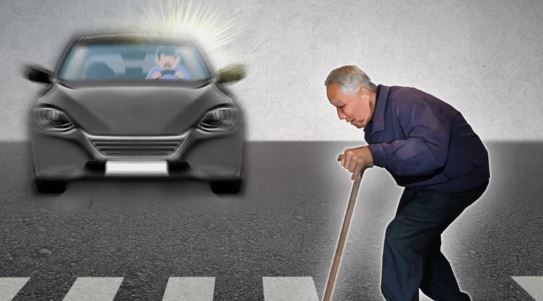Roads becoming unsafe for senior citizens in S. Korea
By Choi Ji-wonPublished : Nov. 18, 2019 - 17:51
As senior citizens increasingly make up a higher proportion of the population, roads here are becoming ever more dangerous for older people.
Around 7 p.m. on Sunday, an 82-year-old man was hit consecutively by a taxi and a sedan making a right turn at an intersection in Chungju, North Chungcheong Province. He was taken to a hospital, but died within an hour. The police investigation showed the man was jaywalking when the first collision occurred.

Last month, an 82-year-old on a bicycle was crushed by a dump truck outside a construction site in Incheon. The driver, who claims to have been following a signalman’s order, said he had not seen the cyclist approaching from the side as he was making an exit from the site. A woman in her 70s in Gwangju is reportedly suffering from severe injuries after being hit by a sedan when she was jaywalking.
According to the police agency’s Road Traffic Authority -- otherwise known as KoRoad -- although the overall number of pedestrian deaths in South Korea has dropped every year, the proportion of victims over 65 is rising steadily. Among the 1,487 pedestrians killed as a result of car crashes last year, seniors comprised 56.6 percent, an increase of 2 percentage points from the previous year and almost 9 percentage points from 2014, KoRoad data showed.
“Seniors crossing the road ignoring traffic signals take up more than two-thirds of the senior pedestrian accidents,” an official at KoRoad’s policy research department said. “Seniors are unaware of or insensitive to the modern traffic rules and often ignore them. The government is making efforts to expand education about traffic regulations to the older generation.”
Meanwhile, drivers over the age of 65 are a rising threat on the road. KoRoad data showed that between 2014 and 2018, the number of collisions caused by drivers in the senior age group jumped 48 percent, exceeding 30,000 last year for the first time in history.
By Choi Ji-won (jwc@heraldcorp.com)












![[Today’s K-pop] BTS pop-up event to come to Seoul](http://res.heraldm.com/phpwas/restmb_idxmake.php?idx=644&simg=/content/image/2024/04/17/20240417050734_0.jpg&u=)





![[KH Explains] Hyundai's full hybrid edge to pay off amid slow transition to pure EVs](http://res.heraldm.com/phpwas/restmb_idxmake.php?idx=652&simg=/content/image/2024/04/18/20240418050645_0.jpg&u=20240419100350)

![[Today’s K-pop] Zico drops snippet of collaboration with Jennie](http://res.heraldm.com/phpwas/restmb_idxmake.php?idx=642&simg=/content/image/2024/04/18/20240418050702_0.jpg&u=)